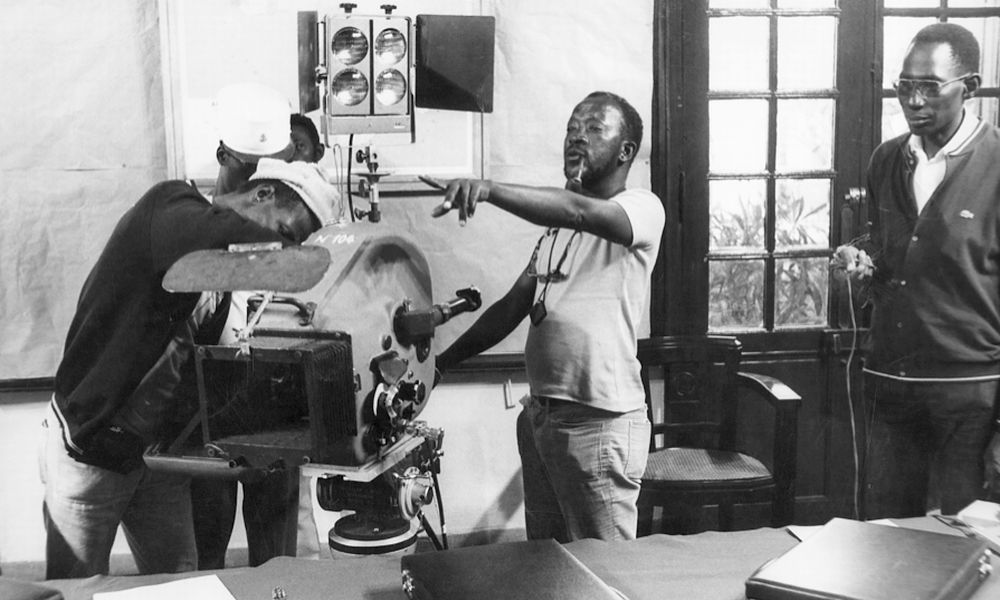"The founder of feature filmmaking in black Africa, or Africa south of the Sahara desert, was Ousmane Sembene of Senegal, a major figure both in literature and film… Through subtle handling of décor, costume, language, performance, and narrative, he fashioned a critique of colonialism and neocolonialism quite as powerful as could be found in more modernist filmmaking styles." - Robert Sklar (Film: An International History of the Medium, 1993)
Ousmane Sembene
Director / Screenwriter / Producer
(1923-2007) Born January 1, Ziguenchor, Casamance, Senegal
Top 250 Directors
(1923-2007) Born January 1, Ziguenchor, Casamance, Senegal
Top 250 Directors
Key Production Countries: Senegal, France
Key Genres: Drama, Social Problem Film, Comedy, Political Drama, Satire, Psychological Drama
Key Collaborators: Dominique Gentil (Cinematographer), Robert Fontaine (Leading Actor), Makhouredia Gueye (Leading Actor), Tabata Ndiaye (Leading Actor), Georges Caristan (Cinematographer), Christian Lacoste (Cinematographer), André Gaudier (Editor), Gilbert Kikoïne (Editor), Myriam Niang (Leading Character Actress), Mustapha Ture (Character Actor), Farba Sarr (Character Actor)
Key Genres: Drama, Social Problem Film, Comedy, Political Drama, Satire, Psychological Drama
Key Collaborators: Dominique Gentil (Cinematographer), Robert Fontaine (Leading Actor), Makhouredia Gueye (Leading Actor), Tabata Ndiaye (Leading Actor), Georges Caristan (Cinematographer), Christian Lacoste (Cinematographer), André Gaudier (Editor), Gilbert Kikoïne (Editor), Myriam Niang (Leading Character Actress), Mustapha Ture (Character Actor), Farba Sarr (Character Actor)
“Dubbed the 'father of African film', Ousmane Sembene made a stand against corruption, colonialism and pernicious tribal traditions, both in his life and work.” - Matt Glasby (A-Z Great Film Directors, 2015)
"Sembene only came to film-making in his early 40s, after years as a manual labourer, union activist and novelist. Such broad experience helped sharpen his insights into colonial exploitation and the tussles between tradition and change in rural and urban lives… Whatever the film, Sembene could never hide his passion, humanity, or trenchant perspective on African history." - The Movie Book, 1999

Black Girl (1966)
"Sembene’s films are not innovative in a technical sense; instead, their power and critical success stem from their compelling portraits of Third World men and women struggling against forces, both internal and external, which threaten their dignity and, in fact, their very existence. Sembene clearly sees himself as a Marxist-Leninist and sees art as necessarily both functional and politically committed. But this does not mean that he is a mere propagandist and, in fact, his art transcends narrow definition. His art is clearly African in character despite his extensive contacts with the West: the filmmaker is the descendant of the traditional griot, recording the history of his society, criticizing its faults, finding strength in its people in the face of the denigration of African society and culture inherent in all forms of colonialism." - Curtis Schade (International Dictionary of Films and Filmmakers, 2000)
“One of the founders of African cinema, most of his films are in Wolof, a language of the Senegalese people and are comedy-dramas that dig deeply into African society and its colonial past, drawn from popular forms of entertainment and local culture.” - Ronald Bergan (A-Z of Movie Directors, 1983)
"The first film director from an African country to achieve international recognition, Ousmane Sembene remains the major figure in the rise of an independent post-colonial African cinema." - The Hollywood.com Guide to Film Directors, 2004
"Sembene was a manual laborer in his late teens who then joined the Free French army in 1942. He worked on the railways in Senegal after the war, and then for ten years he lived in France, working at a Citroën factory and as a docker in Marseilles. While there, he began to write novels—in French—notably, Le Docker Noir, published in 1957. He turned to moviemaking as a way of reaching the large African audience. To that end, he went to study in Russia in the early sixties and was a student of Mark Donskoi… It is often said that Sembene is the father figure of African cinema. Yet that kind of comment shows how far Africa is like another planet. Sembene is a fine director, with his own European ties. But Africa has so many other sources, languages, and visions, most of which we never see." - David Thomson (The New Biographical Dictionary of Film, 2010)
"Cinema is a juxtaposition of images and creativity. Our ancestors, those artists who influenced Picasso and others, were not speaking French or Portuguese when they conceived their art. The creator the filmmaker, must also bear in mind that his responsibility is great. Cinema is the last refuge for our languages. Even our songs are being absorbed and only the harmony is left. African filmmakers who agree with such conditions must do so alone, because creativity is an individual action. With cinema, we run the risk of stressing that separation between Africans speaking their native languages." - Ousmane Sembene, 1992
Selected Filmography
{{row.titlelong}}
GF Greatest Films ranking (★ Top 1000 ● Top 2500)
21C 21st Century ranking (☆ Top 1000)
T TSPDT R Jonathan Rosenbaum
21C 21st Century ranking (☆ Top 1000)
T TSPDT R Jonathan Rosenbaum
Ousmane Sembene / Fan Club
Laura Mulvey, Manthia Diawara, Charles Burnett, June Givanni, Keith Shiri, Sheila Johnston, Horace Ové, Nico Baumbach, Sandra Hebron, Sean Jacobs, Steven Markovitz, Will Noah.
Laura Mulvey, Manthia Diawara, Charles Burnett, June Givanni, Keith Shiri, Sheila Johnston, Horace Ové, Nico Baumbach, Sandra Hebron, Sean Jacobs, Steven Markovitz, Will Noah.
"Fan Club"
These film critics/filmmakers have, on multiple occasions, selected this director’s work within film ballots/lists that they have submitted.
These film critics/filmmakers have, on multiple occasions, selected this director’s work within film ballots/lists that they have submitted.


